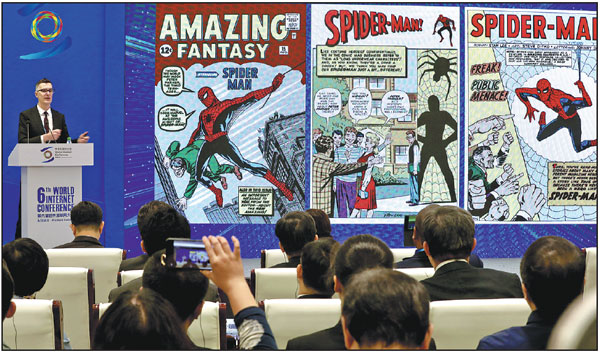Future of internet lies with 'digital natives'
As "digital natives", young people around the globe should be properly guided to make contributions to the development of cyberculture and online cultural exchanges, senior government officials and experts said on Monday.
Sheng Ronghua, vice-minister of the Cyberspace Administration of China, said online culture, including internet literature, videos, music and games have offered an important platform for young people in different countries to understand the world, gain knowledge and make use of their talents.
The richness of cyberspace has created many opportunities and possibilities for young people, and also has an important influence on the development of their values and habits, he said at a sub-forum at the sixth World Internet Conference, which is currently being held in Wuzhen, Zhejiang province.
"As a result, we should create more cyberculture that embodies the crystallization of human civilization, push for innovation in creating new content, equip young people with the ability to protect themselves from harmful content and build international standards to protect young people in cyberspace," Sheng said.

Bill Rosemann, vice-president and creative director of Marvel Entertainment, shares the story of the birth of Spider-Man at the Cyberculture and Youth Forum, a sub-forum at the sixth World Internet Conference in Wuzhen, Zhejiang province. Zhu Xingxin / China Daily
Li Keyong, secretary of the Secretariat of the Central Committee of the Communist Youth League of China, said young people are constantly influenced by cyberculture, so the whole of society should work together to fight against vulgar, violent and pornographic content.
Cybercultures around the world should work together to promote exchanges between young people in different countries, he said.
"Young people are the future leaders of society, and the development of cyberculture requires them to shoulder their responsibility to come up with new technologies, bridge the digital divide, enrich online content and promote cultural exchanges."
Ediola Pashollari, secretary-general of the World Assembly of Youth, said that when people are talking about the internet and cyberculture, they are talking about the most important generation - the younger generation. They make up 90 percent of online users, innovators, idea makers and information exchangers on the internet.
The internet is not only a platform to share knowledge, skills, information and culture. It is also used to bully, discriminate, blackmail and spread hatred and pornography, she said.
All stakeholders - the government, the public, private sectors and the media - should join hands to come up with policies that will protect what identifies us as a people, retain the culture that makes each of us unique and find the similarities of what makes us human, she said.
"I call on young people to make a difference, treat others the way they want to be treated and have an open mind about understanding each other's cultures, not only in real life but also in cyberspace"
Smriti Aryal, head of the office of UN Women China, said that through its openness, the internet has empowered girls and women around the world.
Aryal urged young people to be more responsible online and to promote gender equality, openness and mutual respect, and called on tech companies to fight gender discrimination and bullying, and also to recruit more female staffers, and promote them to senior positions.

 Print
Print Mail
Mail
 20 Cultural Symbols
20 Cultural Symbols Why Zhejiang
Why Zhejiang Experiencing high-tech products at WIC
Experiencing high-tech products at WIC Zhejiang Release
Zhejiang Release Zhejiang News
Zhejiang News